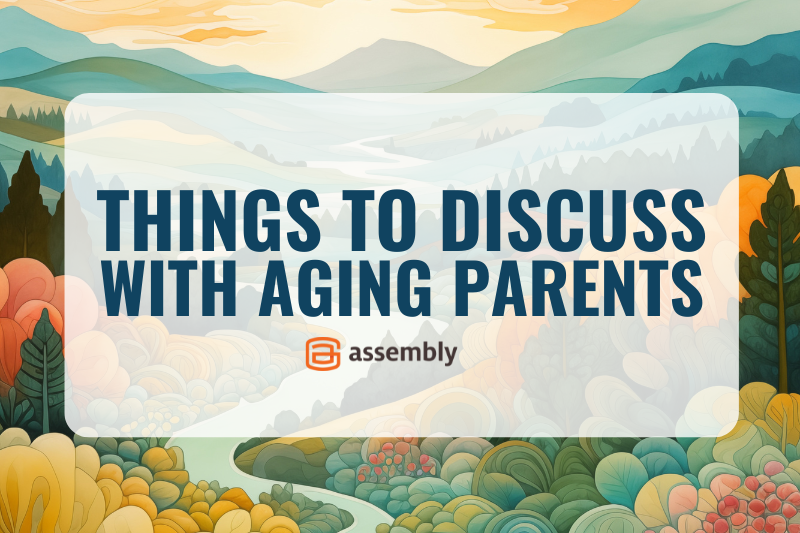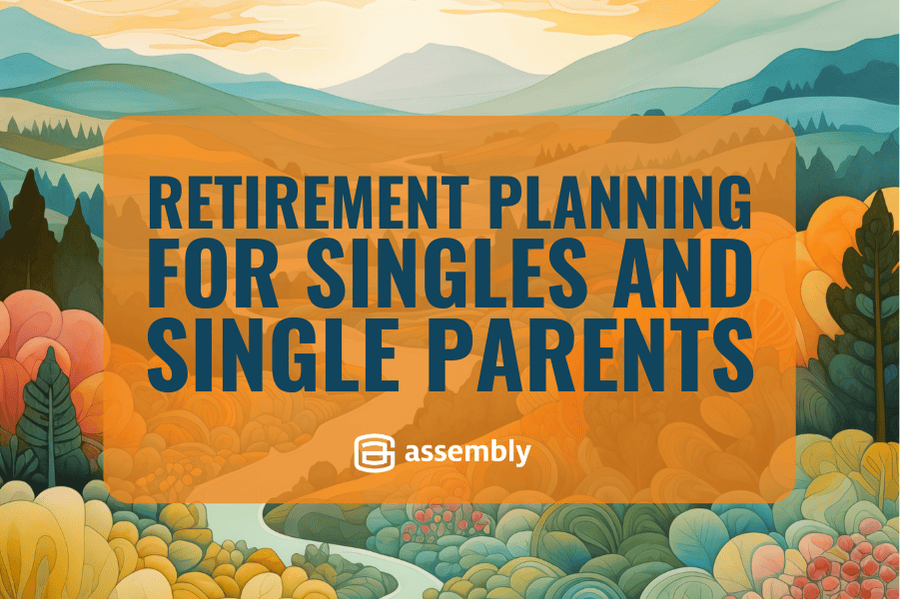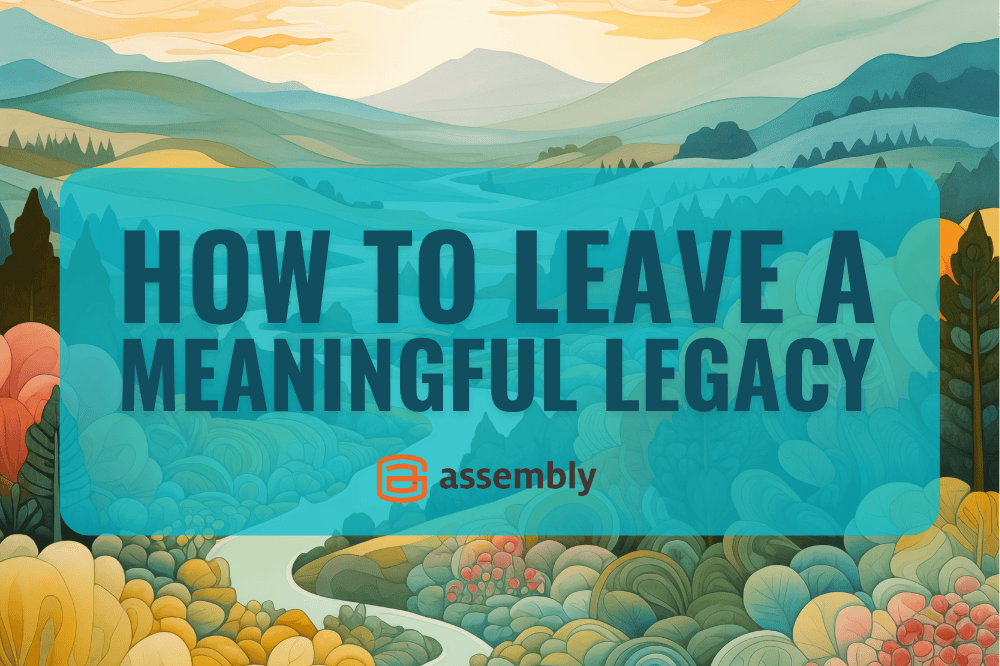Retirement Planning for Singles and Single Parents
Saving for retirement can feel like an uphill battle, even for couples. Planning for retirement solo can feel both liberating and daunting. You get...
4 min read
 Doug Hutchinson
:
Aug 9, 2024 7:13:09 AM
Doug Hutchinson
:
Aug 9, 2024 7:13:09 AM

If you have aging loved ones, filling out an advance medical directive and researching care homes are probably not high on your to-do list (or theirs). But the longer you wait, the more likely it is you’ll have to make difficult decisions with limited information and time.
Below is a list of important things to discuss with aging parents and some tips on how to bring up difficult topics.
Your loved ones may not want to talk about advance medical directives, power of attorney, assisted living, trusts and wills. It’s completely understandable, of course. It means accepting their golden years will come to an end one day.
It can be helpful to reframe the topic. Instead of asking specific questions about inheritance, ask what legacy they’d like to leave. If a parent mentions a friend who moved to senior or assisted living, use that inroad to ask what living arrangements they’d prefer in their later years.
According to AARP, “nearly 90 percent of adults over 65 want to remain in their current homes as they grow older.” If your parents or loved ones want to stay in their home, it’s important to start thinking about (and budgeting for):
An increasing number of seniors live with family members. According to the Pew Research Center: the percentage of parents living with an adult child (14%) has doubled since 1995, when it was only 7%.
Pew surveyed adults living in multigenerational households and found about one-third of upper-income adults either provide care to another adult or receive care. In middle-income and lower-income households, the percentage is higher — 45% and 51%, respectively.
If you care for an aging relative, you may be eligible for a $500 tax credit.* The relative must be claimed as a dependent on your tax return and their gross income for the calendar year may not exceed $4,700. You can also deduct qualified medical expenses not covered by insurance, up to 7.5% of your adjusted gross income.*
* Information is current as of writing. Please check this IRS webpage for the most current information.
It’s a good idea to speak to a financial advisor about long-term care insurance. There are policies that cover in-home care, but they can be difficult to obtain after your loved one turns 70. If your relative may need to spend time in assisted living, start researching the best options and inquire about waitlists.
By 2030, the entire Baby Boomer generation (the second largest generation after Millennials) will be 65 or older. The Census Bureau projects older adults will outnumber children under 18 by 2034.
An advance directive is a written statement that tells doctors and loved ones what to do (or not do) if a loved one is unable to speak for themselves. The National Institute on Aging has helpful resources including where to find advance directive forms and common circumstances to consider (do not resuscitate, do not intubate, etc.).
If your relative would like to provide additional guidance, a living will is a good idea. A living will includes both an advance directive and instructions for end-of-life care should your loved one become unable to speak for themselves.
Anyone with significant personal or business assets should have a designated power of attorney (POA) — regardless of age. If you have not chosen someone to handle your affairs should you become incapacitated, a court may appoint one or more people to act on your behalf. In some states, this includes a public proceeding.
Older adults should have someone who is legally empowered to make medical decisions (a healthcare proxy) and handle financial matters. This can be the same person, or two different people. Either way, there needs to be a legally-binding, written document.
When creating a POA, it’s important to work with someone familiar with local laws and what financial institutions require. Learn more about how to set up a POA.

If your parent or other loved one isn’t comfortable creating an advanced care directive or establishing a POA, try to get answers to the following questions:
For most people, a living trust is the best way to avoid a lengthy probate process and minimize taxes. If your parents or other aging loved ones don’t have a living trust, an experienced financial advisor can help your family create a tax-efficient plan and avoid common pitfalls. An Assembly Wealth client recently saved his heirs an estimated $58,000 in probate related fees by titling his properties in a revocable trust.
Leaving a Meaningful Legacy
A financial advisor can also help your loved ones leave a meaningful legacy through charitable giving. This includes supporting their favorite charities and enjoying tax deductions while they’re still alive.
A few of the options include:
Ask your loved ones to verify if their bank accounts, Health Savings Accounts (HSAs), brokerage, retirement accounts and life insurance (if applicable) have designated beneficiaries on file. Confirm names are spelled correctly and include any generational suffixes, such as Jr. or III, to avoid delays and potential lawsuits.
Your aging loved ones may not want to talk about the future, but delaying these conversations only makes things harder when the time comes. It’s better to have a plan than make hasty decisions.
We’ve helped hundreds of families navigate tough conversations and gain peace of mind. In our view, the most important thing is to get to know people first. After connecting on a human level, we’ll offer ideas and solutions aligned with your family’s values and goals.
Fill out the form to be notified about new articles.

Saving for retirement can feel like an uphill battle, even for couples. Planning for retirement solo can feel both liberating and daunting. You get...

Many Americans don’t have an estate plan because they don't like to think about a time when they will no longer be around. It's understandable, but...

Estate planning isn't just for the ultra-wealthy. Anyone can leave a meaningful legacy by gifting assets to loved ones and causes you care about. A...